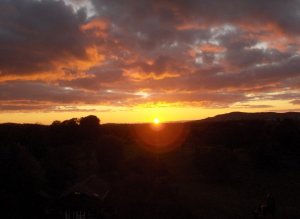I had some difficulty finding the books I wanted to read at the library today, so I picked up Felix Holt: The Radical. I hadn’t gotten to it yet. I think most of us can recognize that feeling of homecoming but at the same time of unfamiliarity–like in a dream when we talk to a family member whose face has somehow changed–when we return to a favorite author. And most of my readers will remember that since age nineteen I have been in a relationship with George Eliot–and it’s not complicated.
Having read George Eliot’s preface, I’m feelings things that I usually only feel at the last page of a Hemingway novel. It’s the sensation of being arrested more than jarred. Not of being shaken but of being woken up. The light was turned on. The music was silenced.
Here are the concluding paragraphs to the preface of Felix Holt, coming at the end of a beautiful narration of a man’s journey northward by coach across the unfolding landscape (topographical, political, and religious) of an England whose culture (for better and for worse) has all but disappeared, where I imagine the narrator has just lifted her pen before setting it down to chart the most political of all landscapes–the human heart.

